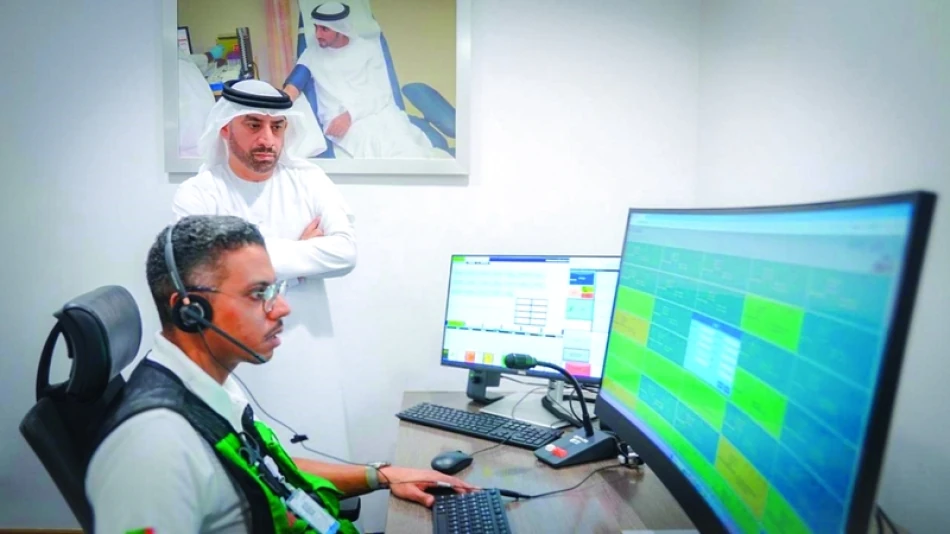
Dubai Ambulance to Revolutionize Remote Healthcare Across the Emirate by 2026
Dubai's Digital Healthcare Revolution: Telemedicine Ambulances Set to Transform Emergency Response by 2026
Dubai is pioneering a groundbreaking shift in emergency medical services by expanding its remote telemedicine system (Tele-EMS) across the entire emirate by 2026. The initiative places emergency physicians in operations centers around the clock, providing real-time medical guidance to ambulance crews through advanced communication technologies—a move that could redefine how cities worldwide approach emergency healthcare delivery.
The Telemedicine Ambulance Model Takes Shape
Dubai Ambulance Services has confirmed the expansion of its innovative Tele-EMS system, which connects field paramedics with emergency physicians through direct digital communication. The program, which launched successfully in late 2022 at the organization's headquarters, has now added a permanent field physician to the remote medicine operations center at Zabeel Ambulance Station.
According to Meshal Abdulkarim Julfar, Executive Director of Dubai Ambulance Services, this expansion represents a strategic initiative to enhance operational efficiency while extending advanced medical coverage throughout Dubai's diverse landscape. The phased rollout aims to establish multiple telemedicine centers across different zones of the emirate.
Real-Time Medical Supervision in the Field
Dr. Maitha Rashid Al Falasi, Emergency Medicine Specialist and Acting Medical Director at Dubai Ambulance, explains that the system enables emergency physicians to provide direct medical support and guidance to paramedics at incident scenes. This real-time supervision allows for advanced care delivery, appropriate medication administration under physician oversight, and critical decision-making about patient transport needs.
The system's impact extends beyond basic emergency response—it enables field teams to deliver more sophisticated medical interventions while maintaining continuous physician oversight, potentially reducing mortality rates for critical cases and improving patient stability during transport.
Global Context: Dubai's Position in Digital Healthcare Innovation
Dubai's telemedicine ambulance initiative positions the emirate alongside other technology-forward healthcare systems globally. While countries like South Korea and Estonia have implemented digital health infrastructure, Dubai's comprehensive approach to emergency telemedicine represents a more integrated model than many Western counterparts.
The timing aligns with broader healthcare digitization trends accelerated by the COVID-19 pandemic, but Dubai's focus on emergency services specifically addresses a gap that traditional telemedicine platforms haven't effectively covered. Unlike routine telehealth consultations, emergency telemedicine requires robust, instantaneous communication systems and highly trained personnel capable of making split-second decisions.
Investment in Human Capital and Technology
The program's success depends heavily on Dubai Ambulance's investment in training paramedic teams to international standards, ensuring they can effectively collaborate with remote physicians during high-stress emergency situations. This dual-layer approach—combining advanced technology with enhanced human expertise—reflects Dubai's broader strategy of positioning itself as a global healthcare hub.
Implications for Healthcare Systems Worldwide
Dubai's model offers several advantages that could influence emergency medical services globally. By centralizing medical expertise while maintaining distributed response capabilities, the system potentially addresses physician shortages in emergency medicine while improving care quality across geographic areas.
The economic implications are significant: rather than staffing every ambulance with highly trained emergency physicians, the system maximizes medical expertise utilization while reducing costs. This efficiency model could prove particularly valuable for healthcare systems facing budget constraints or physician shortages.
Challenges and Scalability Questions
However, the system's success will depend on several critical factors: reliable communication infrastructure, seamless integration with hospital systems, and the ability to maintain quality standards as the program scales. The 2026 completion timeline suggests Dubai is taking a measured approach, allowing for testing and refinement before full implementation.
The initiative also raises questions about liability and medical decision-making in remote supervision scenarios—issues that other jurisdictions will likely monitor closely as they consider similar implementations.
Strategic Healthcare Positioning
This telemedicine expansion aligns with Dubai's broader healthcare strategy, which includes medical tourism promotion and positioning as a regional healthcare center. The emirate's investment in emergency medical innovation could enhance its appeal to international visitors and residents while supporting its economic diversification goals.
The program's integration with Dubai's existing emergency response infrastructure—including rapid response teams, emergency vehicles, and specialized units for major events—creates a comprehensive emergency medical ecosystem that could serve as a model for other rapidly developing urban centers globally.
As Dubai moves toward full implementation by 2026, the success of this telemedicine ambulance system will likely influence emergency medical service development worldwide, potentially establishing new standards for technology-enhanced emergency healthcare delivery.
Most Viewed News

 Sara Khaled
Sara Khaled






